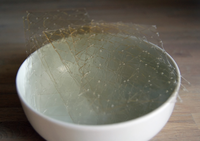
Photo from wikipedia
Abstract Lung cancer is a major cause of cancer-related deaths worldwide. Stimulus-sensitive hydrogels, which can be formed by responding to stimuli in the cancer microenvironment, have been widely studied as… Click to show full abstract
Abstract Lung cancer is a major cause of cancer-related deaths worldwide. Stimulus-sensitive hydrogels, which can be formed by responding to stimuli in the cancer microenvironment, have been widely studied as controlled-release carriers for hydrophobic anticancer drugs. In this study, self-assembling peptide RADA16-I was used to encapsulate the hydrophobic drug emodin (EM) under magnetic stirring to form a colloidal suspension, and the colloidal suspension (RADA16-I-EM) was introduced into environments with physiological pH/ionic strength to form hydrogels in situ. The results showed that RADA16-I had good cell compatibility and the RADA16-I-EM in situ hydrogels can obviously reduce the toxicity of EM to normal cells. In addition, compared with free EM (in water suspensions without peptide) at equivalent concentrations, RADA16-I-EM in situ hydrogels significantly reduced the survival fraction of LLC lung cancer cells, while increased the uptake of EM by the cells, and it also induced apoptosis and cell cycle arrest in the G2/M phase more significantly and reduced the migration, invasion, and clone abilities of the cells in vitro. The RADA16-I-EM in situ hydrogels also showed better cancer growth inhibition effects in cancer models (mice bearing LLC cells xenograft cancer), which induced cell apoptosis in the cancer tissue and reduced the toxic side effects of EM on normal tissues and organs in vivo compared with the free EM. It was revealed that RADA16-I can be exploited as a promising carrier for hydrophobic anticancer drugs and has the potential to improve the administration of anticancer drugs to treat cancer effectively with enhanced chemotherapy.
Journal Title: Drug Delivery
Year Published: 2021
Link to full text (if available)
Share on Social Media: Sign Up to like & get
recommendations!